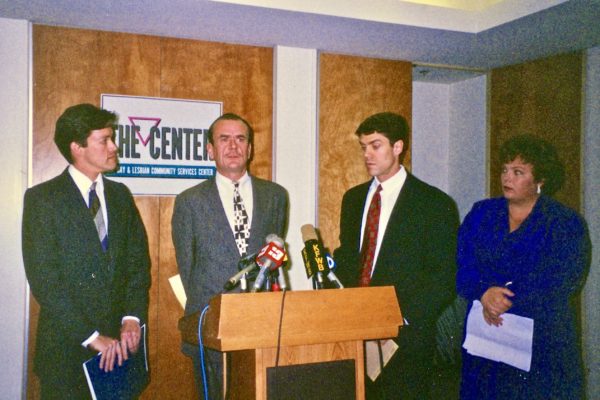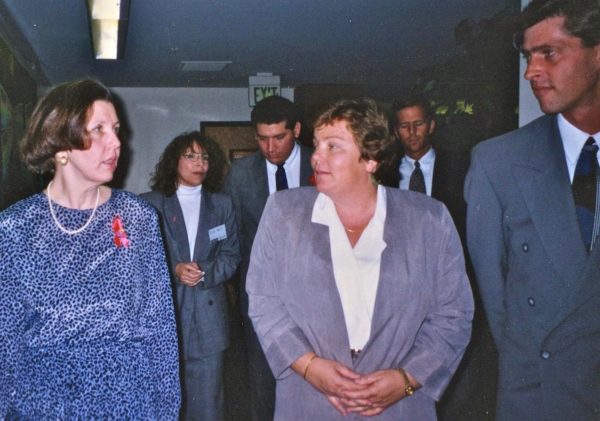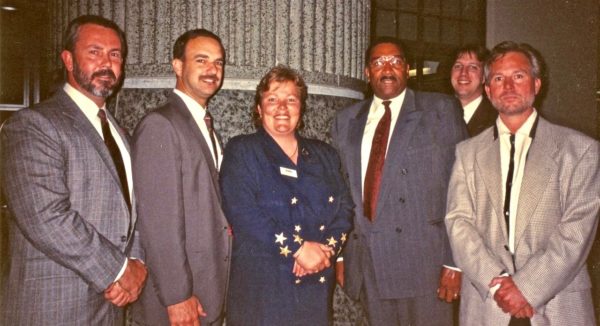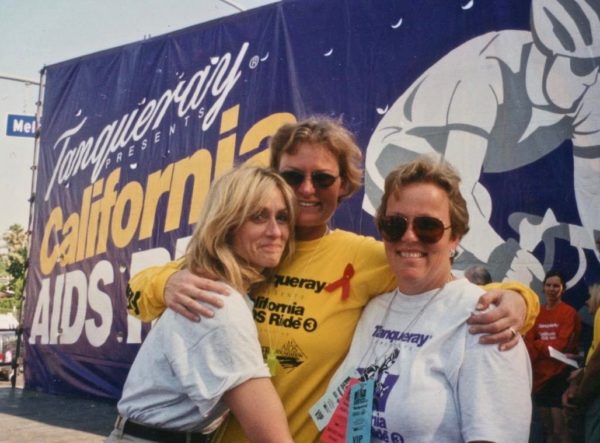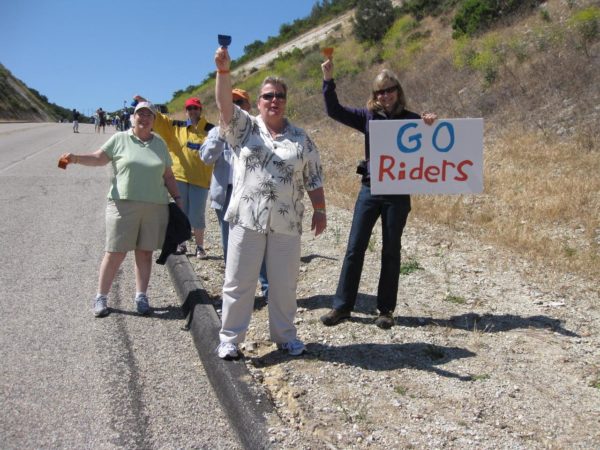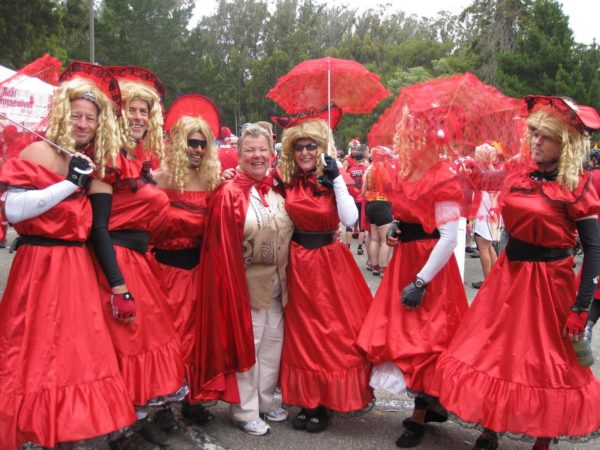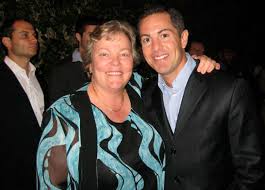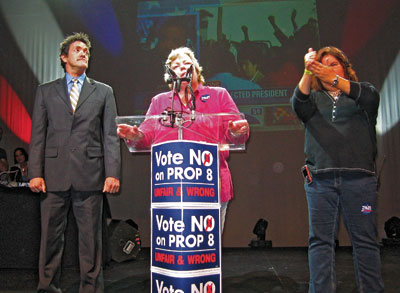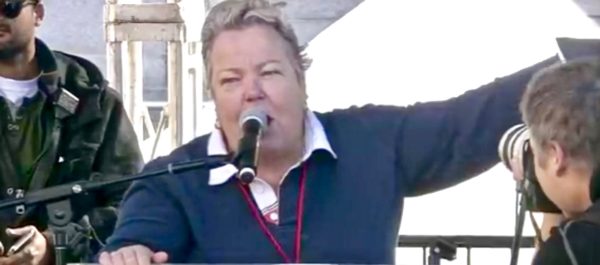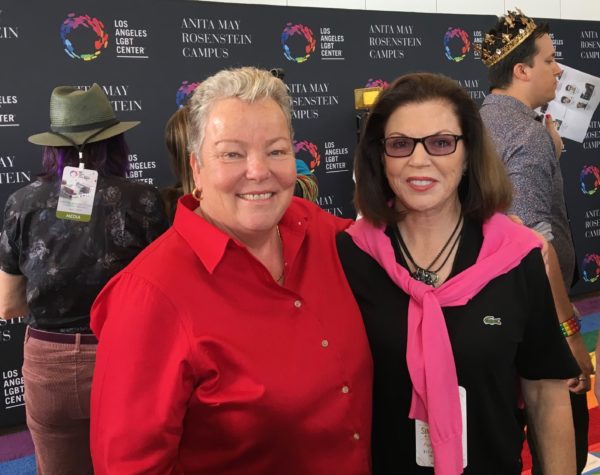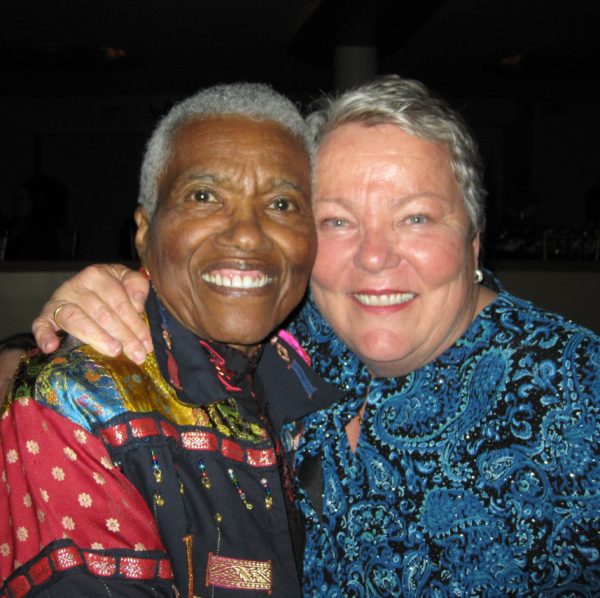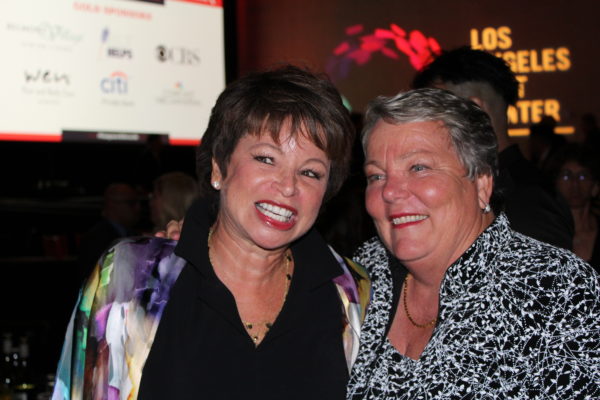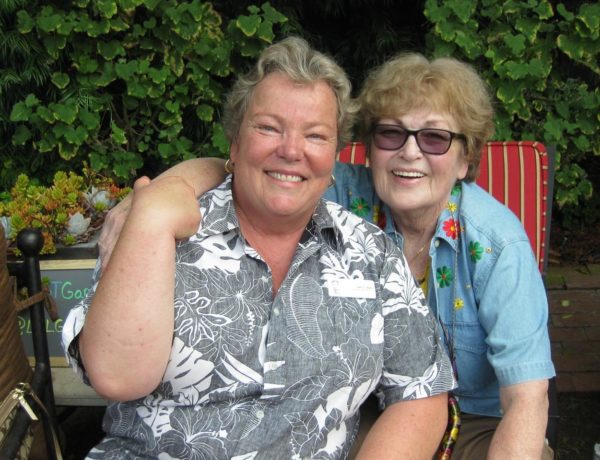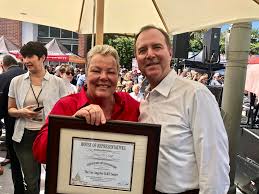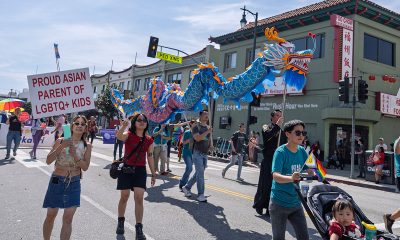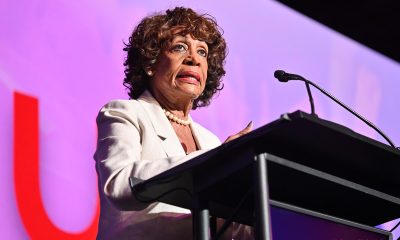Los Angeles
Lorri Jean reflects on her journey to the Center
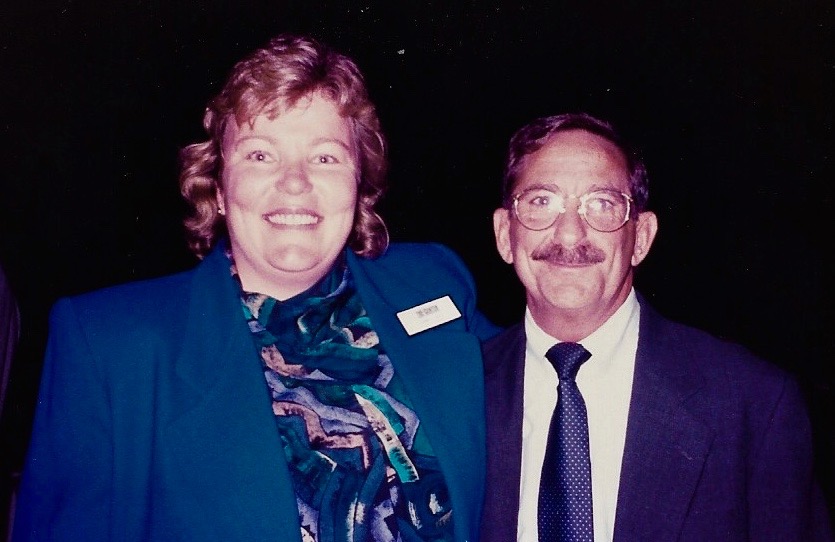
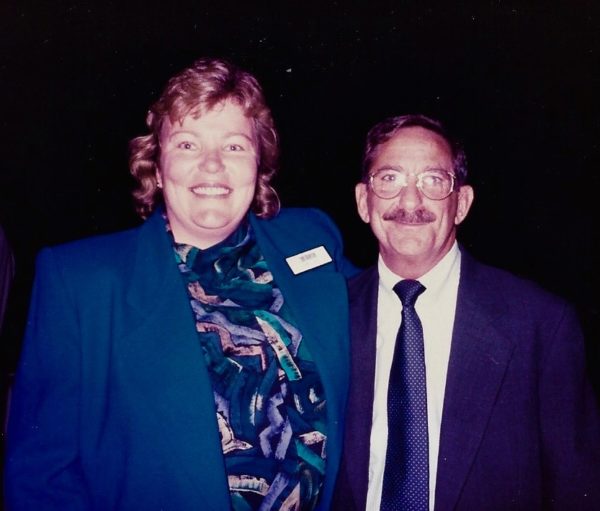
New Los Angeles Gay and Lesbian Community Services Center executive director Lorri Jean with Board co-chair Ed Gould (Photo by Karen Ocamb)
It’s spectacularly ironic, really. Just as the fabric of American democracy is being shredded by a wannabe dictator seeking personal profit, an organization started by a group of gay people being of service to the most marginalized of the marginalized in 1969 has become the nation’s oldest LGBTQ institution, still serving those in need. This year marks the 50th anniversary of the Los Angeles LGBT Center and it is still growing, as evidenced by the historic opening of the huge Anita May Rosenstein Campus in Hollywood.
The Center is not only a real establishment, it is also a metaphor, a modern beacon of hope modeling how grit, determination, organization and a family-of-choice kind of love can overcome enormous obstacles and create services and unique opportunities that wind up benefiting those beyond the circle.
“We’ve suffered such great reversals under [President Donald] Trump in a way that we never had before—because we never had so much to lose before,” says Lorri L. Jean, the Center’s CEO for more than 20 years. “If the Center’s history has been anything, it has been weathering the best of times and the worst of times, persevering, and always prevailing.
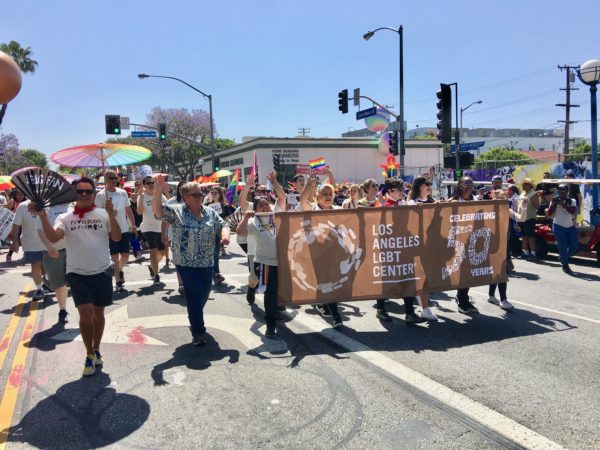
“I think that opening the Anita May Rosenstein Campus in the midst of the worst presidential administration for our community in history is an illustration of what’s next,” Jean says. “We cannot give up. We must continue to provide what our community needs. We have got to be laser-focused on getting rid of Trump and any anti-LGBT cronies—I don’t care what their party is. We deserve to have pro-LGBT presidents, pro-LGBT members of Congress. So we have to focus on that at the same time that we are continuing to care for those in our community who are most vulnerable and most in need.”
As it turns out, Jean is a history buff, a very helpful trait when organizing a 50th anniversary celebration with as many of the pioneers as remain and can attend the Gold Anniversary Vanguard Celebration and concert on Saturday, Sept. 21 at the historic Greek Theatre.
Jean’s perspective on the Center may differ from the seven other executive directors over the decades. But her perspective on the Center’s history stems from a sense of her own history and her deep commitment to assume its profound responsibility to the LGBTQ community and the intersectional ground on which the community stands.
For the longest serving keeper of the Center’s flame, Jean takes leadership of the institution very personally.
It was February of 1979 when Jean first realized she is a lesbian—and it had nothing to do with Harvey Milk or Anita Bryant. She was in her last semester at Arizona State University and in a student government group for women. A closeted professor with whom she socialized wanted to set her up on a date.
“It was a woman! I was shocked, just shocked! I’m like, ‘A woman?’ To make a long story short, that set me off on self-examination about well, why did she think I was a lesbian? Ultimately, at the end of that very tumultuous process of only a few weeks, I came to the realization that I was a lesbian,” Jean says. “It would be many months before I would have my first sexual experience.”
Months later, Jean moved to Washington, D.C. to go to law school. She also became an activist in the LGBT community. “I became the president of what was the Gay Activist Alliance, whose name I immediately changed to the Gay and Lesbian Activist Alliance [in 1986]. My favorite insult happened at that moment when Frank Kameny, for whom I had great respect, accused me of ‘loose and slovenly thinking’ because ‘gay’ includes everyone,” she laughs. “I tried to explain to him why that was not the case.”
Jean was running the all-volunteer GLAA when the AIDS epidemic started hitting hard.
“It was the most rewarding, exciting, passionate work I had ever done,” she recalls. “So I decided that I wanted to work fulltime for the movement. But at that time, the salary scales were so terrible, and I had huge student loans from law school that I could only afford to take one of the top jobs.”
In 1989, she applied to head the Human Rights Campaign Fund and was a finalist with Tim McFeely, who got the job. Realizing she needed to bolster her resume, she brazenly told her boss at the Federal Emergency Management Administration (FEMA) she wanted to be “the highest-ranking career employee running the Western regional office, or Region 9, which included California, Arizona, Nevada, Hawaii and all of the civic territories. It was FEMA’s largest and busiest region. There had never been a woman in that job in any of the 10 regions and there had never been a man under the age of 55. I was, at that point, a 32-year-old out lesbian.”
She got the job, moved to San Francisco and immediately had to handle the Loma Prieta earthquake. “We had a presidentially declared disaster an average of every 30 days for my three-and-a-half-year tenure there,” Jean says. But she gained lots of experience “managing people at a huge level and billions of dollars.” She also kept up her activism on the board of Lambda Legal. That board hired former Center board member Deborah Johnson as a consultant.
“Deborah and I liked each other a lot,” she says. So when Johnson called and told her about a job in LA “with your name written all over it,” she balked over the location but was intrigued and submitted her resume. Then Board Co-Chair Rose Green called and schmoozed her. She went to LA and got a lot of help during the interview process from outgoing director Torie Osborn.
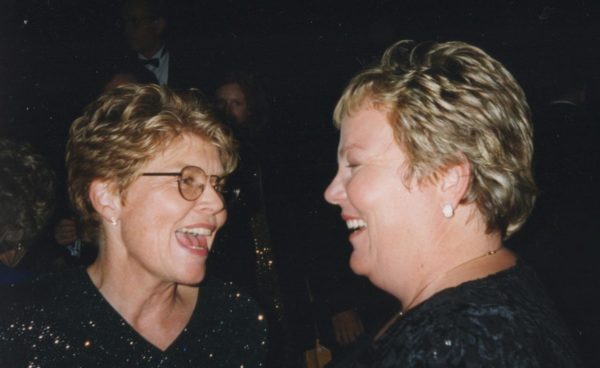
Torie Osborn and Lorri Jean years later (Photo by Karen Ocamb)
“I interviewed in the old Center on Highland Avenue, which was a converted motel. It was one of the best LGBT centers that there was at the time. But it was a dump,” Jeans says. “I walked in there and I thought, ‘Oh, my God. My parents will think I’ve lost my mind.’ I mean, I was on the fast track, a young lawyer in the federal government, who’d been promoted to this important position,” Jean says. “Then they took me over and showed me the new building on Hudson Avenue and I was blown away.
“As I learned more about all of the programs and services, I started to get hooked,” Jean says. “I went home and Gina [Calvelli, an attorney and Jean’s now wife] and I had begun seriously dating, but we weren’t living together. I said, ‘This place is amazing. I can’t believe other people in our movement don’t know about it. It’s doing more than any LGBT center I’ve ever heard of anywhere. It’s amazing. If you wouldn’t consider moving to LA, then you need to tell me right now because I don’t want to get hooked.’”
Calvelli agreed to think about moving to LA, enabling Jean to continue the application process. “I really wanted the job and thank goodness, the board of directors offered it to me,” she says.
Jean had no idea that the Center would become her home and with it, the responsibility to be the keeper of such an important historical flame.
“I understood that this was a very important movement institution,” she says. “I never thought that this would become my life’s career because nobody did that back then. In fact, a big part of my decision when the job was offered to me was what would I do afterwards? Would my career be ruined because I had run a gay and lesbian center? I had some people who I cared a lot about who advised me against it for that very reason. But it’s a good thing to be young because you feel like you can take more risks. I wanted to do it, so I ignored that counsel and took the job.”
At the time, November of 1992, the Center was engaged in a multi-million dollar capital campaign and the annual budget, excluding capital, was a little under $8 million—in the middle of the second wave of AIDS. Jean had lost close friends in D.C., wrote last-minute wills and helped de-gay apartments before the parents came.
But the death of Gabe Kruks, director of programs under Torie Osborn, hit her in another way. With Osborn and other institutional Center leaders leaving, she called on her old friends Darrel Cummings and Kay Osberg. But she and Kruks established a rapport, giving her a lot confidence coming in as the new director.
“Then Gabe died suddenly before I ever got here. It really struck me,” Jean says. “Gabe was going to be our fount of information. So when Gabe died, it was very concerning. It was shocking and sad. But I was young. I was an optimist. And I thought, ‘Well, heck. There’s nothing I can’t learn.’”
Here are just some of the moments of Jean’s 20 year career (photos by Karen Ocamb):
The Center was were the community held news conferences. Here’s Lorri Jean hosting a news conference with attorneys John Duran and Jeff Thomas and their HIV+ client Michael Kolcum who successfully sued LA County for denying him HIV/AIDS medications as an inmate.
Lorri Jean often took visiting dignitaries on tours. Here she and Darrel Cummings escort President Clinton’s first AIDS Czar, Kristine Gebbie, with ANGLE and APLA Board members Diane Abbitt and Dr. Scott Hitt following.
After the LA Riots and the firing of anti-LGBT Chief Daryl Gates, one of the first community stops his successor made was to the Center on Highland. In keeping with the overture, then-unofficial LAPD liaison Dave Kalish joined the Center board. Here’s a photo with (l-r) openly gay LA Police Commissioner Art Mattox, Dave Kalish (who would later become the first openly gay LAPD deputy chief and candidate for Chief), Lorri Jean, LAPD Chief Willie Williams, Sgt. Marc Goodman of the Golden State Police Officers Association, and Mark Thomson, editor of The Advocate’s Long Road to Freedom which was an exhibit at the LA Library.
Jean wanted a signature event that would serve both as a major fundraiser and a symbol of what the Center stood for in the AIDS era. She and others came up with the California AIDS Ride to benefit the San Francisco AIDS Foundation and the LA Gay & Lesbian Center. Here’s actress Judith Light with Pat Christen and Lorri Jean in 1996.
The California AIDS Ride, which became the AIDS LifeCycle after a severance with Pallotta Teamworks, was – and remains – one of Lorri Jean’s favorite events with wife Gina Calvelli.
During the fight over marriage equality, the Center headquarters on Schrader Blvd and The Village at Ed Gould Plaza staging grounds for protests over Gov. Schwarzenegger vetoing Mark Leno’s marriage bills, and the battles over Prop 22 in 2000 and Prop 8 in 2008. Lorri Jean, who headed the LA No on Prop 8 effort, is pictured here with campaign director Patrick Guerrero at an Oct. 2008 fundraiser and with Equality California Board Co-Chair John Duran on Election Night as Barack Obama won and Prop 8 passed.
Over her 20 years, Lorri Jean has appeared on many stages and TV screens advocating for LGBTQ rights, HIV/AIDS and issues impacting the community, as this screen grab from the televised and webcast 2018 Women’s March illustrates.
Lorri Jean has developed and maintained significant relationships with other community leaders such as philanthropist Anita May Rosenstein, longtime Jewel’s Catch One Disco owner Jewel Thais-Williams, award honorees like Obama senior advisor Valerie Jarrett, clients like Alice Hermann and elected officials like Rep. Adam Schiff (Photo by Troy Masters) who came to the Center after Donald Trump’s election to let his LGBTQ constituents know he still has the community’s back.
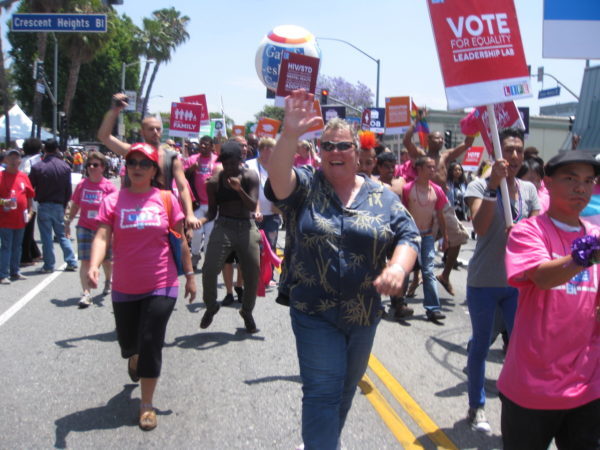
Twenty years later, whether celebrating the pioneers at the 50th Anniversary Gala or prepping for the next AIDS LifeCycle ride, CEO Lorri L. Jean still imparts that spirit of youthful optimism and eagerness to learn. And in a political world seemed set on going back to some old dream that never really was, Jean and the LA LGBT Center insist on forward progress.
Los Angeles
A new “queer summer camp” cycling event rises from the legacy of AIDS/LifeCycle
The LA LGBT Center will host its first ever “Center Ride Out,” a 3-day community cycling adventure from Los Angeles to San Diego.

On April 24, 500 cyclists will meet at Elysian Park before dawn, stretching and preparing for a 110-mile ride through urban scenery and rolling hills. They will be part of the Los Angeles LGBT Center’s inaugural “Center Ride Out,” a 3-day journey that takes riders through Los Angeles and Temecula, reeling to a stop at the San Diego LGBT Community Center.
The cycling adventure is a rejuvenating, communal queer experience that taps into the importance of shared joy and advocacy in the fight to defend LGBTQ+ rights. Its roots are sacred for many queer elders: Center Ride Out rises from the legacy of the cherished AIDS/Life Cycle (ALC), a seven-day cycling adventure from San Francisco to L.A. that formed in 1994 and ended with its last ride in 2025.
In its 31-year run, ALC riders raised over $300 million for HIV and AIDS resources, services, and awareness. This year, Center Ride Out provides a new, exciting extension of this important event, allowing cyclers to raise funds in support of the LA LGBT Center, The San Diego LGBT Community Center, and the LGBTQ Community Center of the Desert.
This support is crucial as LGBTQ+ organizations face a new crisis: widespread defunding. In the last fiscal year, the LA LGBT Center lost $9 million in federal support, according to its CEO Joe Hollendoner. The funding raised by Center Ride Out’s participants will help offset this loss and keep the organization’s various programs and services, from gender affirming care and HIV prevention resources to LGBTQ+ senior and youth support, afloat. “We anticipate further divestment in our work by the Trump administration, [so Center Ride Out] allows people to align their own personal passions with our mission in a broader way,” Hollendoner told the Blade.
Altogether, Center Ride Out participants will cover nearly 200 miles of ground together. At the end of the first 110-mile day from L.A. to Temecula, where riders will get to look at historic landmarks and embark on a museum lunch stop together, the day culminates at campgrounds at Lake Skinner.
Here, riders can take a full rest day at their lakeside camp, where it will exude queer summer camp vibes. There will be massage and medical services, arts and crafts activities, dance parties, and time to relax and connect with the community. “Folks [can] build relationships, have some fun, and feel safe. That’s a feeling a lot of people [need] right now, especially our trans and nonbinary siblings,” Hollendoner said.
Day 3 ends with an 87-mile downhill, coastal ride through the town of Rainbow in northern San Diego County, before ending with a celebratory bash at the San Diego LGBT Community Center.
Hollendoner rode ALC five times while it was active and is excited to be part of this new legacy from its very beginning. “I’ve heard our community elders talk about how powerful it was to be at the start of AIDS/LifeCycle, and the idea that I can be here at the start of Center Ride Out, an event that I hope will go for three decades or longer…It feels really exciting to me,” Hollendoner said.
For newcomers and experienced cyclists alike, Center Ride Out aims to provide an accessible experience: paring down the initial weeklong ALC ride to three days. To take part, cyclists are expected to raise $2,500 by April 10. For those who may struggle to reach this minimum, staff members have established a community fund.
The community fund will also provide scholarships for BIPOC, trans, women, and femme participants — historically underrepresented communities at ALC — as well as microgrants for BIPOC and trans-led teams to encourage a diverse range of cyclists.
Come April, scores of queer cyclists will get to experience this adventure together: one that is both storied and fresh in its purpose, lineage, and joyful expression of queer togetherness. “Center Ride Out is providing an exciting opportunity for people to not only fight back and be in community with one another, but to build resiliency and be surrounded by people who share values around liberation,” Hollendoner said.
To learn how to register, donate to or volunteer for Center Ride Out, more information can be found here. The three-day adventure takes place from April 24 to April 26.
Kristie Song is a California Local News Fellow placed with the Los Angeles Blade. The California Local News Fellowship is a state-funded initiative to support and strengthen local news reporting. Learn more about it at fellowships.journalism.berkeley.edu/cafellows.
Los Angeles
Stonewall Young Democrats bounces back from “quiet year” with Hero Awards

On Saturday, Feb. 7, the Stonewall Young Democrats (SYD), an organization that mobilizes and fosters community for young, LGBTQ+ people, hosted its “Hero Awards” ceremony at Beaches West Hollywood. Under luminous pink light, vibrant crowds of community members showed up to support and celebrate people and organizations spearheading LGBTQ+ visibility, change, and livelihood across L.A. County. Political figures filled the venue wall to wall, including LA Mayor Karen Bass, West Hollywood Mayor John Heilman, West Hollywood Council Member John Erickson, and California Assemblymember Rick Zbur.

Several local advocates and politicians were honored for their queer advocacy and leadership, including City of Los Angeles LGBTQ+ community affairs liaison Carla Ibarra, L.A. Democratic Party Chair Mark Ramos, Congressman Mark Takano, and L.A. County LGBTQ Commission Chair Sydney Rogers. The Los Angeles Blade was also recognized with an Impact Award.
Los Angeles Blade publisher Alexander Rodriguez accepted the award. In his acceptance speech, Rodriguez shared, “We report on and share the struggles of our queer community. We also get to see the resilience and strength our community has, even in the face of adversity. We see firsthand the importance of the Stonewall Young Democrats and the amazing network of people they have put together, as seen here today.”

The Stonewall Young Democrats formed in 2004, immortalizing the 1969 Stonewall riots in its name. The decision to carry the legacies of early gay rights movements is poignant: queer resistance and their enduring battle against political and social marginalization and violence are seared into the organization’s core.
SYD’s President Kanin Pruter is keeping this link to the past alive; it’s a reminder of the interconnectedness of the queer community. “Our history is there for a reason,” Pruter told the Blade. “Without lesbians during the AIDS crisis, we would not be where we are today. And our movement was started by Black trans women.”
This recent Hero Awards marks SYD’s revitalization. After a relatively quiet year, its board is excited to grow its organization, recruit diverse and eager LGBTQ+ folks, and create fruitful opportunities for everyone in the organization to develop their political advocacy and organizing skills.

Most importantly, Pruter hopes that SYD can be a safe, inclusive, and accessible space for any LGBTQ+ person who has felt outcast before. “In a loving and joking way, we’re an island of misfit toys,” Pruter said, who is intentional about creating environments where queer folks who have experienced trauma, isolation, and exclusionary social politics can fit in and belong.
“I want folks to be open, vulnerable and leave any preconceived notions at the door. We come in here [and] we are who we are. We respect each other’s identity, and we’re here to foster a culture where everyone feels welcome.”
Pruter encourages young LGBTQ+ people who are interested in getting involved in SYD, to contact him and learn more about the organization. More information can be found here.
Kristie Song is a California Local News Fellow placed with the Los Angeles Blade. The California Local News Fellowship is a state-funded initiative to support and strengthen local news reporting. Learn more about it at fellowships.journalism.berkeley.edu/cafellows.
Los Angeles
Project Angel Food is now able to feed 10,000 people daily with expanded building
On Thursday, community gathered to celebrate Project Angel Food’s new kitchen and campus building, which allows them to serve more of the county’s critically ill community.
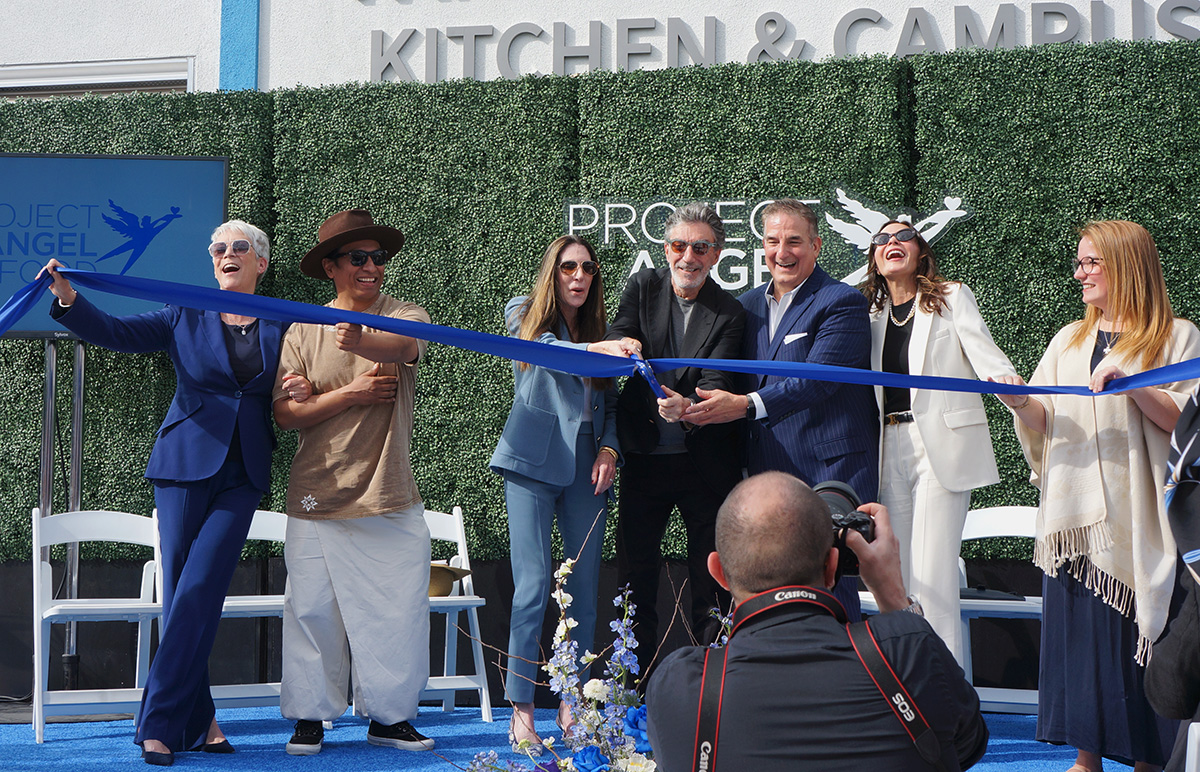
On Feb. 5, community members gathered at 922 Vine Street to celebrate the expansion of Hollywood-based non-profit Project Angel Food. That Thursday morning, the organization cut the ribbon for its Chuck Lorre Family Foundation Kitchen and Campus: one of two new buildings that greatly increase its capacity to provide healthy food and nutritional resources to the county’s critically ill community members.

Project Angel Food was founded in 1989 by author and activist Marianne Williamson and blossomed from a dire need to feed people impacted by HIV/AIDS during the epidemic. Today, the organization cooks and delivers over 1.5 million meals, tailored to specific needs that include chronic illnesses and gastrointestinal issues, to 5,000 people across Los Angeles.
In August 2023, the organization launched its “Rise to the Challenge” campaign, a multi-year expansion and renovation project backed by $51 million. Now, its first phase is complete, and its impact is expected to double.
With the new Chuck Lorre Family Foundation Kitchen and Campus, Project Angel Food’s kitchen staff — which, like the rest of the organization, is majorly powered by volunteers — has access to 16,000 square feet of expanded space, which includes more ovens, walk-in freezers, and hot cook lines than they’ve ever had access to previously. Project Angel Food CEO Richard Ayoub explained today that this will allow staff and volunteers to serve 10,000 people a day.
The organization’s executive chef, John Gordon, explained to the Blade that “space issues” were a major hindrance previously. Before the new kitchen was opened, staff worked out of a much smaller Lincoln Heights facility. “If you didn’t get the rack, you don’t have the sheet pans. If you got the sheet pans, you don’t have the last chiller,” Gordon said, explaining how difficult it was before to balance multiple tasks in the same space. Now, their team of seven chefs, 12 kitchen assistants, dishwashers, and volunteers can work in several cook lines at the same time.
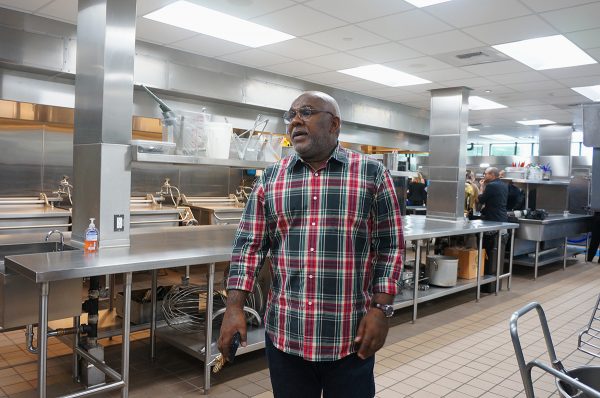
“We’re much more efficient this way,” Gordon continued. In the kitchen, the day begins at 8 a.m. Someone will pick music for the morning, setting a groove for staff as they sync up to review recipes, pack meals prepared from the day before, and cook meals for the next day ahead. After a lunch break, they continue to work until 4 p.m. to make sure they’re meeting the needs of the community they serve.
For locals like Celeste, a Project Angel Food client who is affected by multiple sclerosis, this service is crucial. On days the disability “really takes effect,” being able to receive nutritious meals customized to her needs makes a meaningful difference. “Some days, I’m not able to get up,” Celeste said. “Just that one meal [can] give me an extra boost [and] allow that sun to shine brightly even on my rainy days.”
For advocates and Project Angel Food supporters, Thursday’s celebration was also an act of resistance and a bold declaration against the federal administration. Jamie Lee Curtis, the honorary co-chair of the “Rise to the Challenge” campaign, spoke of the “love” that lay at the core of Project Angel Food’s foundation: a kind of love she finds completely absent in the federal administration.
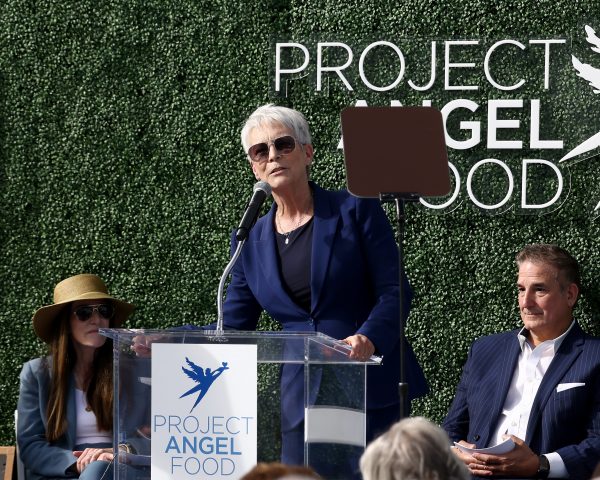
“We are a community here today the same way they are in Minnesota, and I feel like what they’re doing is what we’re doing,” Curtis said to the crowd, defiance firm in her voice. “And we’re only going to get any shit done if we do it together and defy these motherfuckers.”
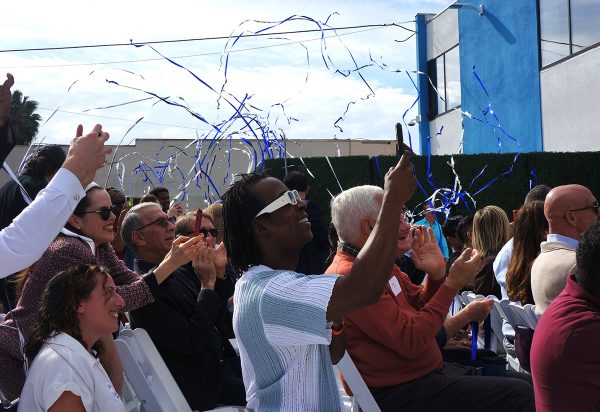
County supervisor Lindsey Horvath, a former delivery volunteer at Project Angel Food, affirmed this statement and guaranteed the county’s continued support in the organization. Horvath spoke of the government’s “glaring absence” during the HIV/AIDS epidemic: one that is “eerily similar” to its attitude now.
As the government mobilizes Immigration and Customs Enforcement (ICE) agents, sending immigrant communities spiraling into crisis, on-the-ground organizations like Project Angel Food are standing in firm support of their marginalized and ill community members. Horvath’s confirmation of county support is also rooted in this mission.
The building’s exterior also reflects the organization’s dedication to its residents. On the south side, a new large-scale mural painted by esteemed local muralist Robert Vargas highlights the stories of local volunteers and vendors who live and work in the neighborhood. Vargas explained that seeing these people in action “crystallized” the dedicated service and harmony that exists among the organization’s volunteers, clients, staff, and nearby community members.
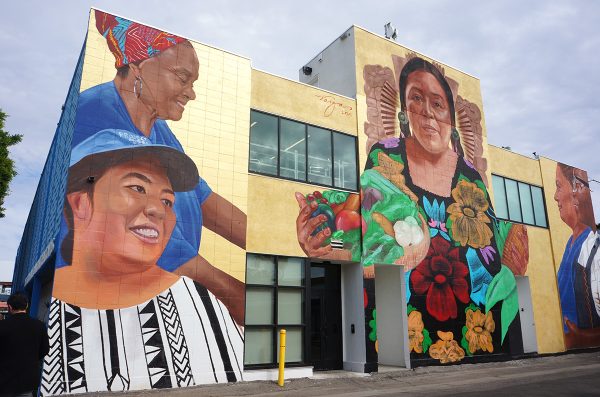
Next, the second building of the Chuck Lorre Family Foundation Kitchen and Campus begins construction this summer. This space will house the organization’s nutrition, volunteer, and client services and will also include its first department dedicated to research and policy. There will also be a training kitchen, where clients will be able to learn how to cook meals on their own.
As Project Angel Food’s growth continues, Ayoub hopes community members who are able to pitch in will do so. While public funding can feel unsteady, he explained, community strength and sustainment can fill those gaps of doubt. The organization is $2.3 million away from its goal in securing capital for this second building, and Lorre will match donations up to $1.5 million.
Kristie Song is a California Local News Fellow placed with the Los Angeles Blade. The California Local News Fellowship is a state-funded initiative to support and strengthen local news reporting. Learn more about it at fellowships.journalism.berkeley.edu/cafellows.
Los Angeles
Community members urge city council to invest in trans lives
Advocates introduced the TGI Wellness and Equity Initiative, a campaign that would direct crucial funding to trans, gender expansive and intersex community organizations.
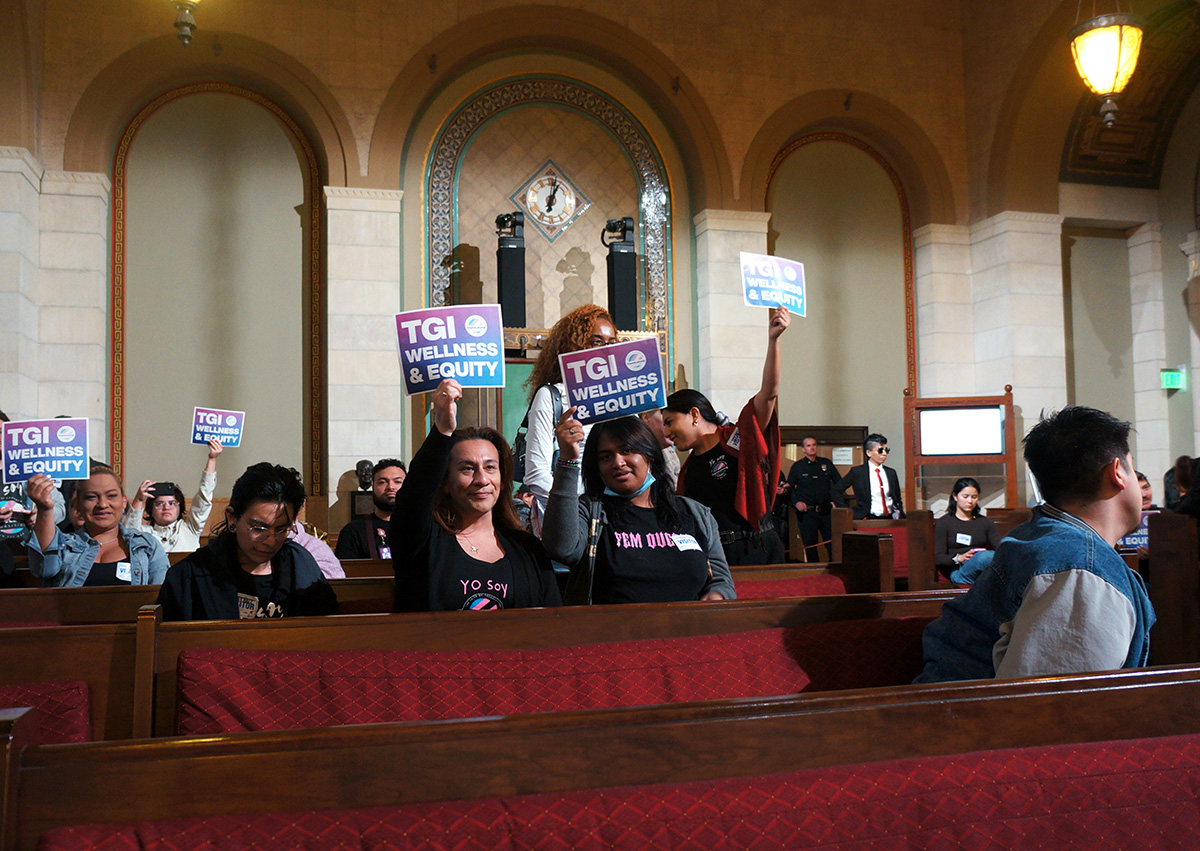
At 9 a.m. on Tuesday, ahead of L.A.’s regular city council meeting, a long procession of people wrapped around the entrance leading into the council chamber. Someone remarked that it was “unprecedented” to see so many people gathered, waiting to get inside. Several housing advocates and legal experts were waiting to make public comments about Measure ULA, otherwise known as the county’s “mansion tax.”
Another fifty or so transgender, gender expansive and intersex (TGI) advocates from the TransLatin@ Coalition (TLC), a long-standing organization that provides housing and meal support, legal services, mental health guidance and peer support groups, showed up to demand real, tangible support on behalf of themselves and their community members as the Mayor prepares the city’s budget on how funds will be allocated.
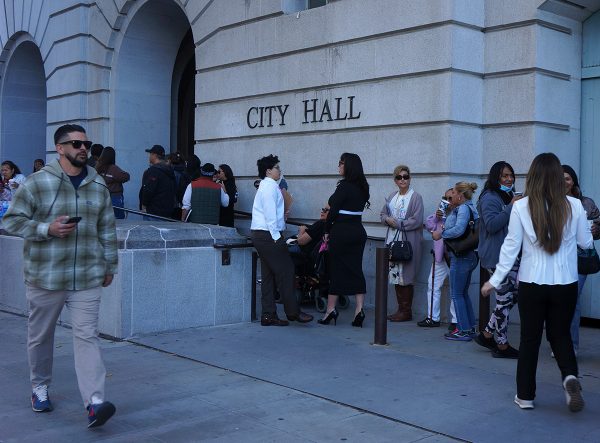
TLC advocates called on the city council to invest in their TGI Wellness and Equity Initiative (TGI WE), a two-year pilot program that would provide $4 million to five organizations that support the safety and rights of local TGI people. This money would expand each organization’s ability to hire more staff and expand their outreach, resources, and ability to serve a continually underserved community: TGI Angelenos who are multiply marginalized as violence against trans people and immigrants continues to increase.
During public comment, TLC president and CEO Bamby Salcedo requested that the council move forward with the initiative. Aside from general support, she asked that two council members act as co-sponsors and petitioners for the initiative. This way, TGI WE can be added as an official agenda item for future city council meetings, which would get the ball rolling for the initiative’s funding goals.
“Right now is the time to stand in solidarity with our community and stand against the federal government, who is attacking and trying to disappear trans people,” Salcedo told council members. Several other advocates, including TLC policy ambassador ChiChi Navarro, Christopher Street West board member NiK Kacy and Invisible Men director Jovan Wolf delivered passionate statements in support of TGI WE.
“Los Angeles is in a state of crisis, and our communities are running out of time,” Navarro told the council. They also spoke to the county’s growing investment in LAPD, while TGI organizations receive nothing. “This is not a resource shortage. It is a resource allocation choice [that] is costing lives. We need this council to introduce the TGI Wellness and Equity initiative immediately…We cannot wait. We need urgent investment today.”
TGI WE would fund community-run organizations that focus on individualized care that is facilitated with language support and sensitivity training, a kind of care that is crucial for TGI community members who often face criminalization and discrimination at the hands of law enforcement agents.
“We are their lifeline, and we demand your support,” Jovan echoed. “It’s time for the city of L.A. to make good on its promises to be for everyone…You and all of us know that we have been marginalized, pushed to the sidelines, and we continue to be an afterthought in your budgets and your agendas.”
When the meeting concluded, TLC members rallied together for a demonstration, calling out: “Support trans lives!” as council members filed out of the chambers.
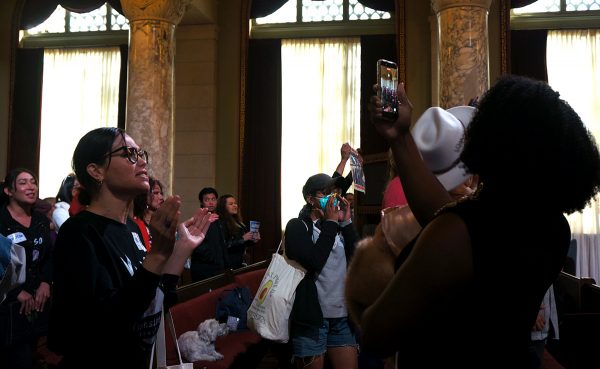
On the quiet walk back onto the street outside, Navarro reflected on the importance of this meeting and the effort community members made to be there. “A lot of the time, not just city council, [but] groups in general tend to forget trans people,” Navarro told the Blade. “Trans people are here. You saw today: clearly, we’re not a small pocket. I think we have to show them: we’re here [and] we’re not going anywhere.”
“It’s not great to be left in a place where you’re expected to continue to do the work, but without any actual support,” Navarro continued. Besides concrete funding, official citywide support for TGI WE would affirm that elected officials are willing to take a stance and take meaningful action when it comes to supporting TGI community members. “So it’s not just the money,” Navarro said. “L.A. has a motto, [that] L.A.’s for everyone. But I don’t know how you can say that when you’re not doing everything in your capacity to protect everyone.”
Kristie Song is a California Local News Fellow placed with the Los Angeles Blade. The California Local News Fellowship is a state-funded initiative to support and strengthen local news reporting. Learn more about it at fellowships.journalism.berkeley.edu/cafellows.
Los Angeles
UCLA’s long-standing LGBTQ+ alumni organization welcomes new president
The Blade sat down with paralegal studies professor and local advocate Bobby Rimas to talk about intersectional leadership and his goals for the UCLA Lambda Alumni Association.

As a young student studying history at UCLA, Bobby Rimas was grounded by his growing desire to give back to his community. He worked as a tutor for low-income students and became invested in learning about the ways intersectionality impacts people’s access to education and resources. “My barriers may not be the same as yours, and your barriers may not be the same as mine,” Rimas told the Blade. “How do you apply that in leadership [and] in the classroom?”
After 15 years of service to UCLA’s various alumni networks, first beginning with the Pilipino Alumni Association, Rimas became president of the university’s Lambda Alumni Association on Jan. 1. The UCLA Lambda Alumni Association was formed in 1989 as a way to support LGBTQ+ students and graduates with professional development, scholarship opportunities, mentorship, and other outreach support.
UCLA has long been a local epicenter of queer activism and advancement. Students formed groups like the Gay Student Union and Lesbian Sisterhood in 1969 and 1973, respectively, to empower and connect queer students. Queer art and culture also thrived in this time, as students saw the launches of the queer campus paper, magazine, and a film festival that centered on LGBTQ+ stories.
Administratively, campus officials were taking a stance against LGBTQ+ discrimination. In 1975, UCLA Chancellor Charles E. Young banned departments and programs from discriminating on the basis of sexual orientation.
In the decades since, leaders like Rimas are working to preserve this history and also build upon it. How can we inspire students in and out of the classroom? How do we make sure they have access to valuable resources and can advocate for themselves in places that are not always inclusive of their needs and identities?
Rimas often ponders these questions, both as president of the Lambda Alumni Association and at Cal State LA, where he works as an associate professor of paralegal studies. There is often cross-pollination in the concerns he receives from alumni members as well as his students: How do they find employers who are accepting of LGBTQ+ people? How do they avoid being discriminated against in the workplace?
These are questions Rimas hopes to tackle more in his role as president of the UCLA Lambda Alumni Association and in his continued tenure as an educator. One of his first goals is to expand the board and bring on more diverse perspectives to the organization. “More people means more activity,” Rimas said, who hopes that the combined knowledge and resources of the board can better serve students and alumni.
Rimas also hopes to throw a large Gala event, one that mirrors the extravagant, celebratory 2019 bash he organized for the association when he was first brought onto the team. 100 people attended, creating a wave of awareness for the organization and increasing their scholarship funding.
What’s next? UCLA Lambda Alumni Association’s first board meeting is this upcoming Monday. Rimas hopes to discuss strategies to grow the organization’s presence beyond the campus’ reach, in other queer cornerstones like West Hollywood, elevating diverse LGBTQ+ voices, and improving ways they can professionally support their network’s members.
Kristie Song is a California Local News Fellow placed with the Los Angeles Blade. The California Local News Fellowship is a state-funded initiative to support and strengthen local news reporting. Learn more about it at fellowships.journalism.berkeley.edu/cafellows.
Los Angeles
South L.A. celebrated Black joy and resistance at yesterday’s Martin Luther King Jr. Day Parade
The Blade also sat with staff from Center South, a community site that champions the safety and health of South L.A.’s LGBTQ+ communities of color.
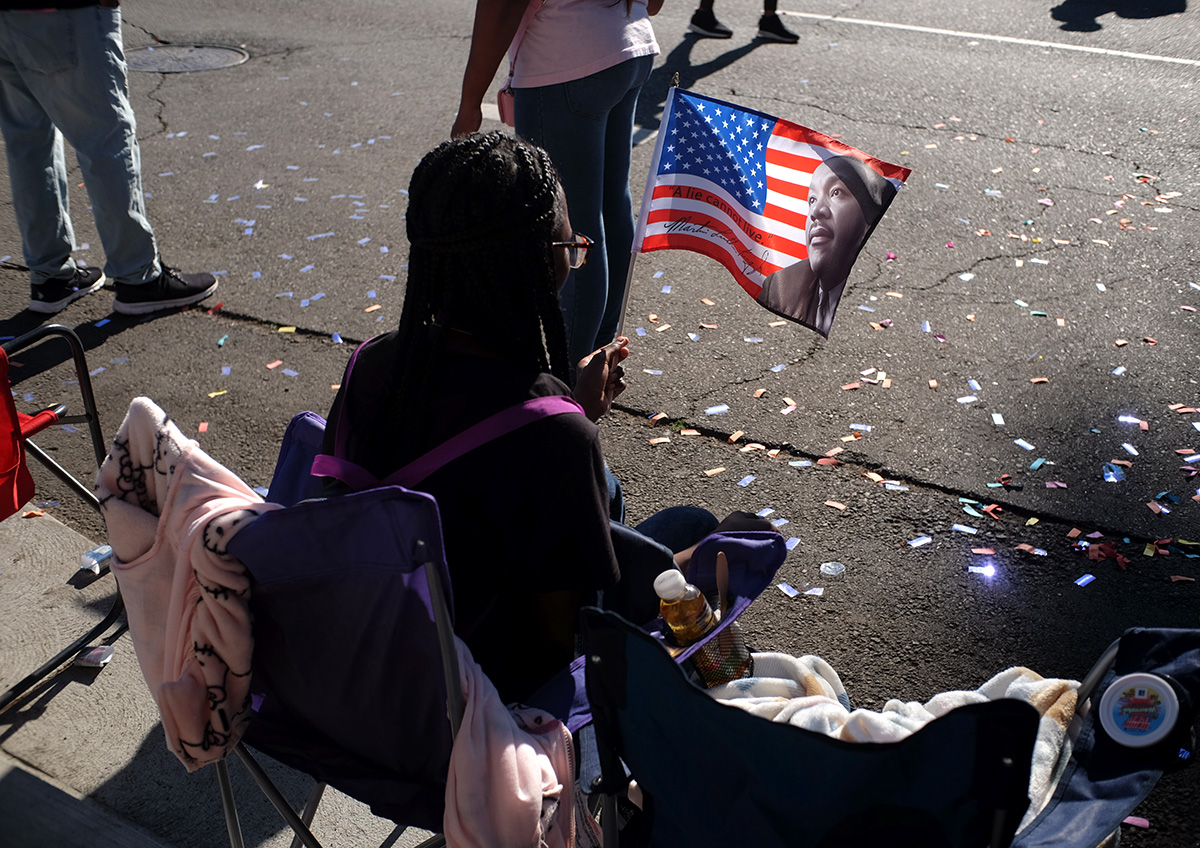
At 9 a.m. on Monday, Jan. 19, South L.A. community members gathered on the streets, holding onto lawn chairs and the hands of their children and family members. “Good morning,” one greeted. “Are you ready for the parade?” Neighbors laughed and hugged underneath the warm morning sun, staring into the horizon in anticipation of the county’s official Martin Luther King Jr. Day Parade, organized by Bakewell Media and the Los Angeles Sentinel Newspaper.
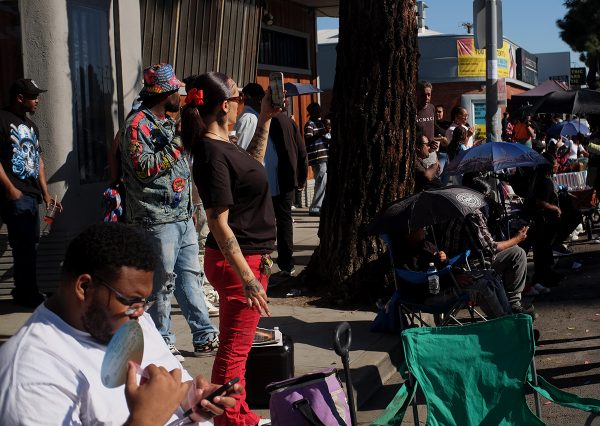
When the parade began an hour later, organizations like labor union SEIU Local 721, civil rights group Black Lives Matter Los Angeles, and HIV care and advocacy nonprofit AIDS Healthcare Foundation marched to cheers and waves from the crowd. Young musicians, drill and cheer teams from Marcus Garvey School and other schools stepped in unison, performing elaborate routines and sending jolting, infectious waves of drum and trumpet like electricity through paradegoers.
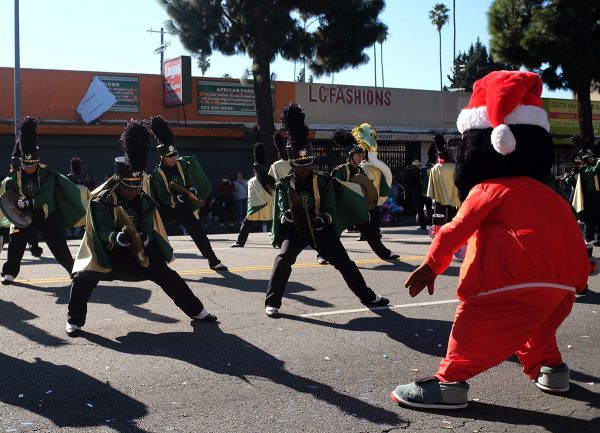
Black liberty and joy coalesced with a call to face injustice at yesterday’s festivities. Black Lives Matter Los Angeles members handed out flyers demanding accountability for Keith Porter, who was killed by an off-duty Immigration and Customs Enforcement (ICE) agent on Dec. 31. Marchers also waved the Iranian flag in solidarity with its people, who have faced increasing state-sanctioned violence after they began protesting the government in the midst of an economic downfall.
Communal care and empowerment remain, for many, the only way forward as trust in broader governmental systems and structures wanes. While celebrating the monumental work of the late civil rights activist, community members yesterday echoed an important, resonant message: The work is not yet done.
This community work is largely supported by local advocates and organizations like Center South: one of the Los Angeles LGBT Center’s community sites. Yesterday morning, ahead of the parade, senior program manager Steven Campa and fellow staff members welcomed people into the space for coffee and pastries.
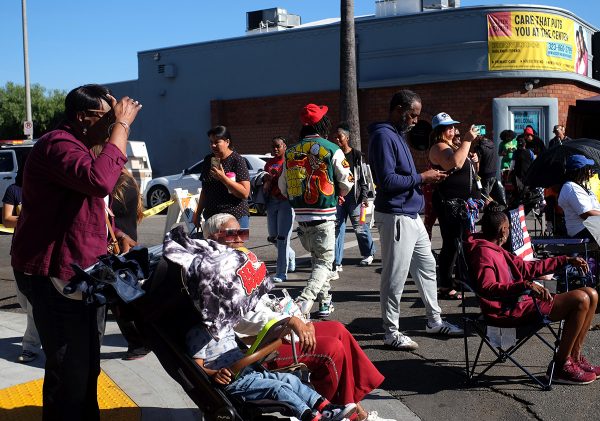
They also handed out flyers introducing residents to the site’s resources, which include: hygiene kits, HIV testing, a free monthly farmers market and clothing closet, mental health and primary care services, substance use and recovery programs, as well as social groups that prioritize LGBTQ+ people of color living in the neighborhood.
Center South opened six years ago, reclaiming a space that once housed a vibrant jazz supper club. At first, the site focused on providing services specifically for men who have sex with men (MSM), regardless of whether or not they identified as a member of the LGBTQ+ community. Over time, Center South became more inclusive of and responsive to the local community as a whole, becoming a safe space for anyone in South L.A. seeking refuge and care.
Campa, who has been with Center South since its founding, emphasized the constantly-evolving nature of the place as it molds itself to best serve and represent its community. Staff members and clinicians are nurtured by their own personal connections to the neighborhood, yearning to give back to the place that raised them.
And that has an effect. “How does it look to have a provider who’s queer: a provider that looks like folks in the community?” Campa said. “We’re our community. Folks grew up [here]…To speak to the MLK Day parade, this was a holiday for the Center. Folks chose to be here. Understanding that we are on MLK Boulevard, we want to continue to do [show up] every year to provide a safe space for the community.”
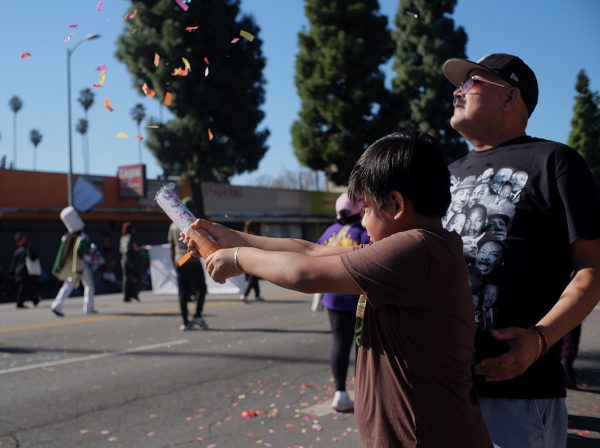
Campa, his staff members, and fellow Los Angeles LGBT Center staff want to expand what it means to be safe and healthy — and to see that reflected more broadly in their communities. “A healthy person needs medical care [and more],” said the Center’s chief equity officer, Giovanna Fischer, who showed up on Monday to celebrate the parade with the community. “[They also] need food access, immigration support…That’s definitely going to impact their health and wellbeing,” Fischer told the Blade. “
Campa, Fischer, and other advocates are strategizing for their community in uncertain times, as threats to instrumental funding are seemingly always on the table. But as they “forecast for the future” and continue to build a collective vision that uplifts LGBTQ+ people of color, their fight endures. “We deserve to think about where we want to go,” Fischer said. “We deserve the opportunity to dream and scheme, and so does our community. So until further notice, we’re going to continue to do that.”
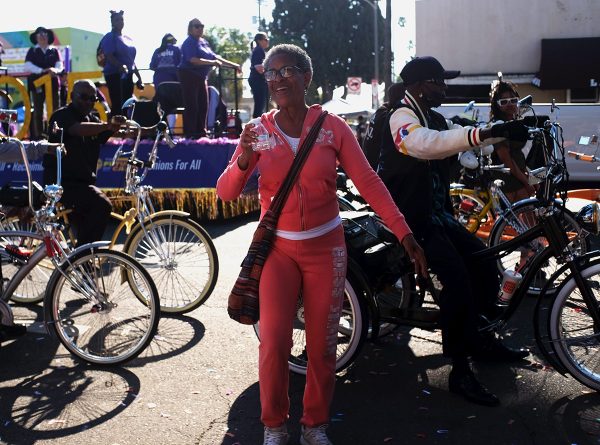
Kristie Song is a California Local News Fellow placed with the Los Angeles Blade. The California Local News Fellowship is a state-funded initiative to support and strengthen local news reporting. Learn more about it at fellowships.journalism.berkeley.edu/cafellows.
Los Angeles
Advocates demand that trans youth be protected as cases are argued in Supreme Court
This week, LGBTQ+ advocates and legal experts spoke in support of trans youth as two Supreme Court cases challenge their rights and safety.

This Tuesday, the Supreme Court heard oral arguments regarding two cases about transgender girls in sports: Little v. Hecox and West Virginia v. B.P.J.
In 2020, Idaho Governor Brad Little signed into law HB 500, which bans transgender girls and women from participating in school sports. This affected the first case’s respondent: transgender student athlete Lindsay Hecox, who was barred from participating in the track and cross country teams as well as intramural soccer and running clubs.
In 2021, then-governor of West Virginia, Jim Justice, approved HB 3293, which enacts a similar ban. Becky Pepper-Jackson (B.P.J.), now an incoming high school student, opposed the discriminatory policy when it prevented her from joining her then-middle school’s cross country and track and field teams. Pepper-Jackson has also only undergone female puberty due to gender-affirming care, but West Virginia argues that its anti-transgender policies should be upheld because of her assigned sex at birth.
For LGBTQ+ advocates and allies, these cases illustrate the burden and harm transgender people face daily as their rights to privacy, dignity, care, and inclusion are constantly at risk of being eroded and stripped completely.
Experts also wonder if these cases could potentially reshape the Constitution’s Equal Protection Clause as well as the civil rights law, Title IX. The former prohibits discrimination on other factors aside from race, though governments have argued that certain “suspect classifications” can be looked at more closely through “heightened scrutiny.” The latter prohibits sex-based discrimination in federally-funded schools.
What is unfolding and how local advocates are informing change:
The fight ahead is weary, and experts are certain that the states involved will not concede their points. In a webinar organized yesterday by the Williams Institute, several LGBTQ+ policy experts, including Rutgers Law School professor and anti-discrimination scholar Katie Eyer, examined where these cases may be heading, as well as efforts to muddy the arguments.
“It seems possible that the court might try to sidestep that issue here by saying that these laws don’t target transgender people at all,” Eyer said. “I think for most people, this seems bananas: like an upside-down world. We all know these laws were about transgender people.”
Jenny Pizer, an attorney for the LGBTQ+ civil rights legal organization Lambda Legal and a co-counsel member for the B.P.J. case, affirmed this sentiment at a press conference organized Tuesday by Lambda Legal and AIDS Healthcare Foundation affinity group, FLUX. “They’ve gone to great lengths to say there’s no discrimination,” Pizer said. “[They’re arguing] it’s just technicalities or classifications.”
Eyer was one of three Equal Protections scholars who filed an amicus brief to be considered in the Supreme Court cases. An amicus brief is a legal document submitted by someone who is not involved directly in a case but who may offer additional perspectives and information that can inform the ruling process.
Eyer’s brief provided historical context that clarified the disadvantages of blanket sex-based policies. These types of laws, according to Eyer, uphold stereotypes over nuance, truth, and equal protection guidelines. For Pepper-Jackson, who has only undergone female puberty and who does not “benefit” from what dissidents define as a sex-based competitive “advantage,” the state should have provided her the ability to argue that she should have the same rights as other girls.
“Of course, the state hasn’t done that here,” Eyer said. “Under these precedents, the Supreme Court should invalidate the laws as applied to those trans girls who really don’t have a sex-based competitive advantage.”
Who are these bills protecting?
The states argue that their policies are merely “ensuring safety and fairness in girls’ sports.” But queer advocates understand that this is a veneer for the exclusion of transgender people from society. Forcing trans youth out of sports “does not protect anyone,” according to California LGBTQ Health and Human Services Network director Dannie Ceseňa, who spoke at Tuesday’s press conference.
“It encourages the scrutiny of children’s bodies. It fuels gender policing, and it creates hostile school environments — not safer ones,” said Ceseňa. “Our youth should not inherit a world that treats their existence as a threat.”
Transgender people are systemically disempowered
At yesterday’s webinar, Distinguished Visiting Scholar at the Williams Institute Andrew Flores discussed his own amicus brief in support of Pepper-Jackson. The brief highlights the need for “heightened judicial scrutiny” in Pepper-Jackson’s case because the majority of political processes “systemically fail” transgender people.
For example, the transgender community faces substantial barriers in exercising their voter rights because of voter identification laws and other policies that regulate and define identity. “Even being able to gain access to the franchise is a burden for transgender people,” Flores said. “The court does play an important role there. It can grant legitimacy to arguments…or at least [acknowledge] that these issues are more complicated than maybe how they’ll receive them.”
What’s next?
Experts are hesitant about where the cases stand. “Bottom line: I don’t know what the court is going to do in these cases. They may send them back down for further development,” Pizer said, who thinks future rulings will not shift more overarching policies regarding transgender rights. “I think they will probably decide based only on laws about sports, not laws more broadly about the rights of trans folks.”
But whatever is decided, the impacts will trickle down to everyone. While the cases deal specifically with anti-transgender policies, experts warn that LGBTQ+ issues have always been tied to racial, economic, and disability justice. “There’s this looming constitutional campaign to really undermine civil rights,” said Eyer. “That affects LGBTQ people. It affects people of color. It affects people with disabilities. It affects everybody, and it really is concerning.”
As transgender inclusion and safety are being argued on the largest legal stage, advocates are asking: “When are you going to step up?” They are also sending a direct message to transgender youth: “We see you, we believe in you, and we are fighting for you,” said Ceseňa. “You deserve joy, community, and care. You deserve a future that reflects who you are and not who anyone or any politician demands you to be. Trans youth deserve better.”
Kristie Song is a California Local News Fellow placed with the Los Angeles Blade. The California Local News Fellowship is a state-funded initiative to support and strengthen local news reporting. Learn more about it at fellowships.journalism.berkeley.edu/cafellows.
Los Angeles
AIDS Healthcare Foundation will celebrate its legacy of food relief at the New Year’s Rose Parade
This Thursday, AHF will march at the Rose Parade in celebration of its “Food for Health” program: an initiative that has fed community members in need for five years.

This Thursday, the AIDS Healthcare Foundation (AHF) will march in the highly-anticipated Rose Parade in Pasadena. AHF will present a Jack and the Beanstalk float with the titular character climbing amongst ginormous tomatoes, eggplants, strawberries, and tomato plants. It’s befitting of this year’s parade theme: “The Magic in Teamwork,” which celebrates the power of collective effort and unity.
The whimsical design also honors the organization’s “Food for Health” program, an initiative that began in 2021 to respond to food insecurity across the U.S. For nearly five years, “Food for Health” has hosted free food pantries and farmers’ markets, providing hot meals and fresh groceries nationally for families and veterans in need of food assistance.
“Food for Health” was also crucial in the wide-sweeping emergency response various nonprofits were trying to organize after the devastating Palisades and Eaton Fires in January. AHF’s program delivered over 75,000 hot meals to evacuees and Los Angeles Fire Department (LAFD) first responders.
The float also honors the individuals fueling these on-the-ground efforts, like Janet and Christy Lee, the sisters behind Altadena’s Fair Oaks Burger. For eight months after these major fires broke out, the Lee sisters worked closely with “Food for Health” to host free weekly farmers’ markets in the parking lot of their restaurant to support community members who had been displaced and impacted by the wildfires.
Both sisters will join fellow local advocates and leaders like labor activist Dolores Huerta, LAFD Captain Thomas ‘Kit’ Kitahata, Champions of Caring Connections executive director Bettye Randle, and “Food for Health” directors Carlos Marroquin and Tara O’Callaghan as riders on the AHF float.
The Rose Parade begins at 8 a.m. on Thursday morning, marching through 5 miles of Colorado Blvd. Now in its 137th year, the parade’s inaugural event was held in 1890 and continues to delight local residents and usher in the new year with illustrious musical performances and grand floats. More information about tickets and parade guidelines can be found on Pasadena’s Tournament of Roses website.
Kristie Song is a California Local News Fellow placed with the Los Angeles Blade. The California Local News Fellowship is a state-funded initiative to support and strengthen local news reporting. Learn more about it at fellowships.journalism.berkeley.edu/cafellows.
Los Angeles
Recent L.A. County report reveals record number of hate crimes against transgender and nonbinary community members
The county’s Commission on Human Relations (LACCHR) released its annual hate crime analysis, revealing a rising violence against LGBTQ+ Angelinos.

Last Thursday, Los Angeles County’s Commission on Human Relations (LACCHR) released its 2024 Hate Crime Report, which analyzes data compiled from over 100 reporting groups, including local law enforcement agencies, educational institutions, and community-based organizations like the TransLatin@ Coalition. In its 45-year history of compiling these reports, the LACCHR recorded an “unprecedented” amount of hate crimes in this most recent analysis.
The report states that there were 102 anti-transgender crimes, “the largest number ever documented in this report.” 95% of these reported incidents were violent.
Part of the reason for this increase in reported crimes is the expanding outreach LACCHR is trying to create with partner organizations, ensuring that queer community members feel increasingly safe in reporting crimes that have been committed against them. These “grassroots efforts” have proven invaluable in building community trust, according to Dr. Monica Lomeli, who leads the production of LACCHR’s annual hate crime report.
“For the LGBTQ community, [there’s] a history of not being heard, not being believed or being misgendered,” Lomeli told the Blade. “I remember us working with a lot of different law enforcement agencies [and] victims would tell us: ‘They keep misgendering me. They don’t believe me. They keep having me make different reports.”
Lomeli stresses that, for those who feel unsafe reporting hate crimes to law enforcement agents, there are other options. One of these pathways is the commission’s community-centered initiative and reporting system, LA vs Hate, which allows people to report hate crimes and access resources like multilingual reporting guides. There is also 211 LA, a program funded by the commission that provides free, confidential support in 140 languages.
The report is instrumental to the formation of initiatives focused on queer safety and is also a resource to various LGBTQ+ organizations as they track violence committed against their community members. But the collection of this data has not been smooth, especially in this current administration.
Lomeli explained that, earlier this year, the now-defunct Department of Government Efficiency (DOGE) reached out to various human rights organizations, including the LACCHR, and was aiming to gain access to and shut down the commission’s hate crime database. “There was an attempt to bring down our data,” said Lomeli, who described these attempts as an infringement on the general public’s ability to access the report’s findings.
Moving forward, the commission’s Network Against Hate Crime, which hosts quarterly meetings with leaders from law enforcement agencies, advocacy groups, educational institutions, and social services providers, will hold a briefing on the report and discuss collaborative solutions to support community members.
Lomeli hopes to bring LGBTQ+ issues to the “forefront” of one of these upcoming meetings, given the high number of hate crimes committed against queer community members that were highlighted in the report. LA vs Hate will also continue to host campaigns, marketing efforts, and awareness events to promote the equitable treatment and safe existence of queer and other marginalized Angelinos.
Kristie Song is a California Local News Fellow placed with the Los Angeles Blade. The California Local News Fellowship is a state-funded initiative to support and strengthen local news reporting. Learn more about it at fellowships.journalism.berkeley.edu/cafellows.
Los Angeles
LGBTQ+ community calls out Radio Korea over host’s homophobic comments; station acknowledges but skirts accountability
On Nov. 3rd, Radio Korea host Julie An claimed that “gay people began the spread of AIDS” on a talk show broadcast by the station.
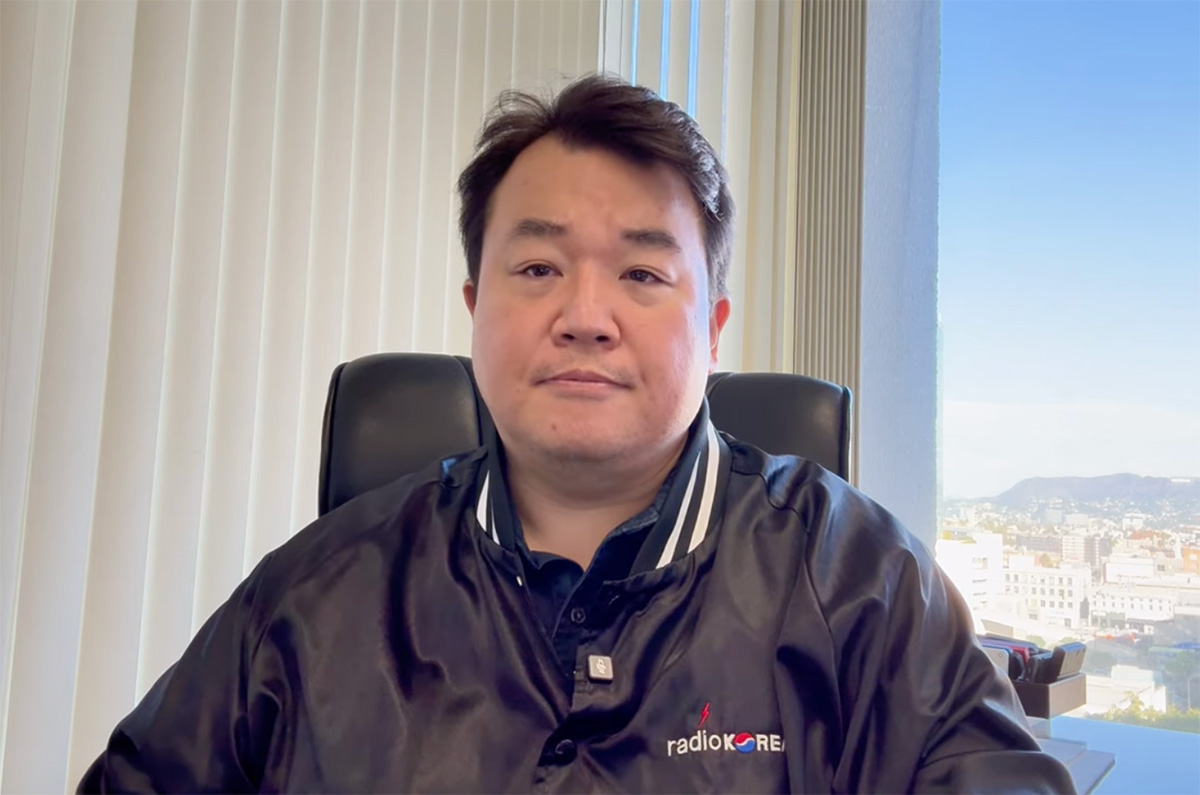
On Monday, Nov. 3rd, Radio Korea aired its regular morning talk show program, where one of its hosts, Julie An, discussed her lack of support for the LGBTQ+ community, citing her religious beliefs. She also went on to comment that gay people spread HIV and AIDS, and that conversation therapy — which has been linked to PTSD, suicidality, and depression — is a viable practice. Clips of this have since been taken down.
Radio Korea offers Korean language programming to engage local Korean American and Korean immigrant community members. Its reach is broad, as Los Angeles is home to the largest Korean population in the U.S, with over 300,000 residents. As An’s words echoed through the station’s airwaves, queer Korean community members took to social media to voice their concern, hurt, and anger.
In a now-deleted Instagram post, attorney, activist, and former congressional candidate David Yung Ho Kim demanded accountability from the station. Writer and entertainer Nathan Ramos-Park made videos calling out Radio Korea and An, stating that her comments “embolden” people with misinformation, which has the ability to perpetuate “violence against queer people.”
Community health professional Gavin Kwon also worries about how comments like An’s increase stigma within the Korean immigrant community, which could lead to increased discrimination against queer people and their willingness to seek health care.
Kwon, who works at a local clinic in Koreatown, told the Blade that comments like An’s prescribe being gay or queer as a “moral failure,” and that this commonly-held belief within the Korean immigrant community, particularly in older generations, strengthens the reticence and avoidance clients hold onto when asked about their gender or sexual orientation.
“When you stigmatize a group, people don’t avoid the disease — they avoid care,” Kwon explained. “They avoid getting tested, avoid disclosing their status, and avoid talking openly with providers. Stigma pushes people into silence, and silence is the worst possible environment for managing any infectious disease.”
For weeks, Radio Korea did not offer a direct response to the public criticism. Its Instagram feed continued to be updated with shorts, featuring clips of its various hosts — including An.
On Friday, Radio Korea CEO Michael Kim released an official statement on the station’s YouTube page. In this video, Kim stated that An’s comments “included factual inaccuracies” and that the station “does not endorse or share the personal opinions expressed by individual hosts.” Kim also stated that Radio Korea “welcomes members of the LGBT community to share their perspectives” in order to deepen understanding through dialogue.
Afterwards, Kim continued that though he acknowledges the “pain” felt by queer community members, he concluded: “I don’t think Radio Korea needs to apologize for what was said any more than Netflix should apologize for what Dave Chappelle says, or any more than Instagram or TikTok should apologize for what people say on their platforms.”
Kim then offered a justification that An’s statements were “not part of a news report,” and that he was “disappointed” that David Yung Ho Kim, specifically, had been vocal about An’s comments. Kim stated that he was the first person to interview David in 2020 during his congressional campaign, and that he had provided the candidate a platform and opportunity to educate listeners about politics.
“After all these years, the support Radio Korea has given him,” said Kim, “the support I personally gave him, even the support from other Radio Korea members who donated or even volunteered for him — he dishonestly tried to portray Radio Korea as being an anti-gay organization.”
Kim went on to criticize David’s purported “hurry to condemn others,” and also questioned if David has disowned his father, who he states is a pastor. “What kind of person is David Kim, and is this the kind of person we want in Congress?” Kim asked viewers, noting that Koreatown is “only about three miles from Hollywood, and some people just like to perform.”
At the end of the video, Kim stated that his duty is to guard the legacy of the station. “My responsibility is to protect what was built before me and ensure that Radio Korea continues serving this community long after today’s momentary controversies disappear,” Kim said.
For community members and advocates, this response was unsatisfactory. “The overall tone of the statement felt more defensive than accountable,” Kwon wrote to the Blade. “Instead of a sincere apology to the LGBTQ+ community that was harmed, the message shifts into personal grievances, political dynamics, and side explanations that don’t belong in an official response.”
Kim’s portrayal of the criticism and calls to action by community members as a “momentary controversy” paints a clearer picture of the station’s stance — that the hurt felt and expressed by its queer community members is something that will simply pass until it is forgotten. An continues to be platformed at Radio Korea, and was posted on the station’s social media channels as recently as yesterday. The station has not outlined any other action since Kim’s statement.
Kristie Song is a California Local News Fellow placed with the Los Angeles Blade. The California Local News Fellowship is a state-funded initiative to support and strengthen local news reporting. Learn more about it at fellowships.journalism.berkeley.edu/cafellows.
-
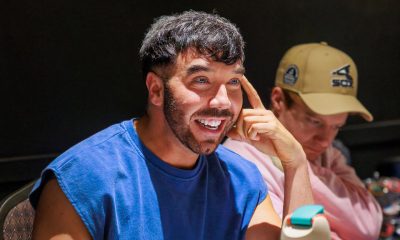
 a&e features3 days ago
a&e features3 days agoFrom ‘So Random’ to sexy theater: LA’s very own Mathew Scott Montgomery
-

 Los Angeles3 days ago
Los Angeles3 days agoA new “queer summer camp” cycling event rises from the legacy of AIDS/LifeCycle
-
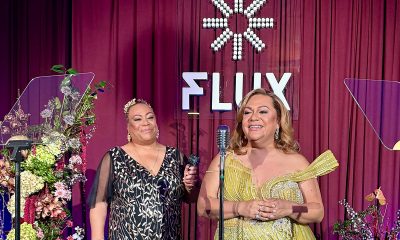
 Transgender4 days ago
Transgender4 days agoTrans-led organization FLUX celebrates a decade of “transformative” service to TGI communities
-

 Commentary4 days ago
Commentary4 days agoWhat Grindr’s pricey new subscription says about the gays, intimacy, and capitalism in the age of AI
-
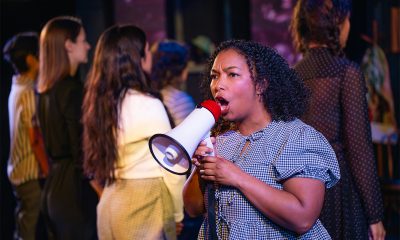
 Reviews23 hours ago
Reviews23 hours ago“The June Jordan Experience” captures the late queer poet’s tender, revolutionary legacy

